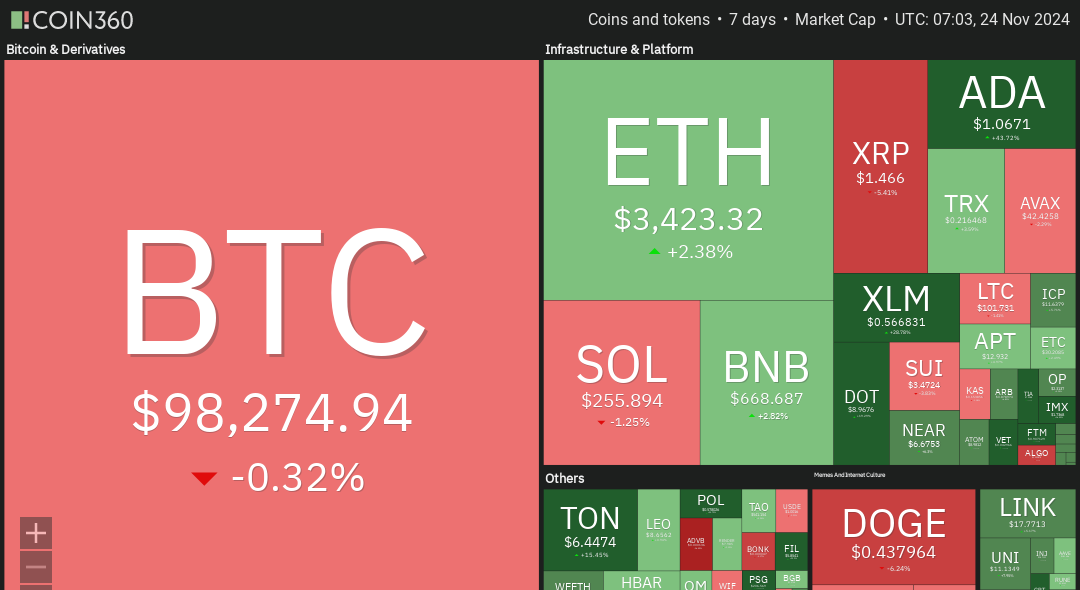📔 Weekly Journal: The Digital Backup of Tuvalu
[6 min read] Your weekend guide to getting ahead on the digital frontier. Today, the usual market news & how Tuvalu is backing up its island as a digital twin in case rising water erases it forever

Welcome to this week’s Weekly Journal 📔, your guide to the latest news & innovation in emerging technology, digital assets, and our exciting path to the Metaverse. This is week 103 of the 520 weeks of newsletters I have committed to, a decade of documenting our physical and digital lives converge.
New subscribers are encouraged to check out the history & purpose of this newsletter as well as the archive.
- Ryan
🌐 Digital Assets Market Update
To me, the Metaverse is the convergence of physical & virtual lives. As we work, play and socialise in virtual worlds, we need virtual currencies & assets. These have now reached mainstream finance as a defined asset class:
🔥🗺️ 7-day heatmap below, showing the current share of the market for the top cryptocurrencies, and their change in price over the last week. A sea of green this week.
🎭 Crypto Fear and Greed Index is based on volatility, social media sentiments, surveys, market momentum, and a few other bits and pieces.
🗞️ Interesting news from this week
EY has introduced an AI avatar named eVe to assist job candidates with pre-interviews in the metaverse. This AI-driven avatar helps candidates prepare for real interviews by answering company-specific questions and offering insights into EY’s hiring process, benefits, and office culture. eVe aims to reduce interview stress by providing a conversational and less intimidating experience, allowing candidates to engage without the social pressure of interacting with a real person. Powered by OpenAI’s GPT-4 model, eVe offers detailed responses tailored to EY's specific content, reflecting the firm’s commitment to using advanced technology in recruitment. Candidates can also take virtual office tours, enhancing their experience. EY’s initiative, which began in October 2024, is part of a broader trend in utilizing AI to streamline hiring processes and improve accessibility, particularly among younger, early-career candidates.
Basketball legend Shaquille O'Neal has agreed to an $11 million settlement over a class-action lawsuit related to his promotion of the Astrals NFT project. The lawsuit accused O'Neal and other entities involved in the project of promoting unregistered securities tied to 10,000 Solana-based metaverse avatars. Investors claimed they were misled after O'Neal used his celebrity status to push the NFTs, only for the project to fail. The settlement is seen as a positive outcome for affected investors, especially as Astrals faced financial collapse. This case highlights the risks and legal challenges in the emerging metaverse and NFT space, where celebrity endorsements often blur the lines between entertainment and investment.
O2, a British telecom giant, has introduced an innovative AI-driven defense system for scammers. They have deployed "Daisy," a virtual "grandma" designed to waste scammers' time with endless, irrelevant conversations, preventing potential fraud on a large scale. By using large language models, Daisy engages scammers for up to 40 minutes, wasting their resources while protecting 24 million customers. This autonomous system turns the tables on fraudsters targeting vulnerable elderly individuals. With AI playing an essential role in fraud prevention, O2's approach highlights how conversational AI can be used creatively and effectively in real-world applications, including the protection of users in a digital, increasingly interconnected future. This strategy complements broader AI efforts in the industry, like predictive modeling and real-time fraud detection, reflecting the expanding role of AI in cybersecurity.
👓 Read of the Week
Tuvalu, a Pacific island nation facing existential threats from climate change and rising sea levels, is creating a digital replica of itself in the metaverse. This virtual version, part of the "Digital Nation" project, aims to preserve Tuvalu’s culture, heritage, and sovereignty as much of the nation becomes uninhabitable by 2050. The initiative includes digitizing the country’s infrastructure, cultural artifacts, and even personal memories, enabling Tuvaluans to stay connected even as they may be forced to relocate. Additionally, the government is using blockchain technology for digital passports to maintain governance. While some view this as a practical adaptation to the climate crisis, others argue it may be premature. Nevertheless, Tuvalu’s efforts could offer a new model for small island states struggling with climate-induced displacement, balancing the preservation of culture and statehood in a digitally connected world.
🎥 Watch of the week
AI 🎨🤖🎵✍🏼
In the Metaverse, AI will be critical for creating intelligent virtual environments and avatars that can understand and respond to users with human-like cognition and natural interactions:
AI companies like OpenAI, Meta, and Google have long believed that more data equals better models, scaling linear improvements in large language models (LLMs). However, this approach is being questioned, as it may soon hit diminishing returns. Executives are exploring more efficient, smaller models and new training methods. While adding compute and data improves models, it’s becoming clear that this strategy is simplistic and potentially unsustainable. Experts like Aidan Gomez suggest shifting to smaller models to reduce costs, though some worry this won’t lead to artificial general intelligence (AGI). Others, such as Richard Socher, advocate for advanced training methods that could minimize errors. Despite these concerns, companies like OpenAI continue to refine their models, with the latest release, o1, emphasizing better inference at the cost of greater computational demands. The ongoing debate about the future of AI models, particularly in the context of the metaverse, highlights the search for balance between scalability and efficiency.
"To summarize, if we were to anthropomorphize, gpt-4 is like your super know-it-all friend who when you ask them a question starts talking stream-of-consciousness, forcing you to sift through what they're saying for the gems," Waleed Kadous, a former engineer lead at Uber and former Google principal software engineer, wrote in a blog post. "o1 is more like the friend who listens carefully to what you have to say, scratches their chin for a few moments, and then shares a couple of sentences that hit the nail on the head."
That’s all for the free version this week! If you have any organisations in mind that could benefit from learning about emerging technology, be sure to reach out. Educational workshops are one of many consulting services I offer.
DCA With Me 🤑
Dollar Cost Averaging is an investment strategy in which an investor regularly invests a fixed amount of money into a particular asset/asset class at regular intervals, regardless of its current market cycle. By doing so, the investor can reduce the impact of market volatility and potentially earn a better return over time. Motto = time IN the market beats trying to time the market
To experiment with this, I invest $50 NZD into a Digital Asset every week. Each week I will choose an asset that seems underpriced in the short term and has positive long-term potential. My timeframe is 3-5 years. I don’t give financial advice but if you want to follow along with me you can use my easycrypto.co.nz referral link to support this newsletter. Let’s dive into this week’s pick:
Keep reading with a 7-day free trial
Subscribe to Metaverse Field Guide to keep reading this post and get 7 days of free access to the full post archives.


